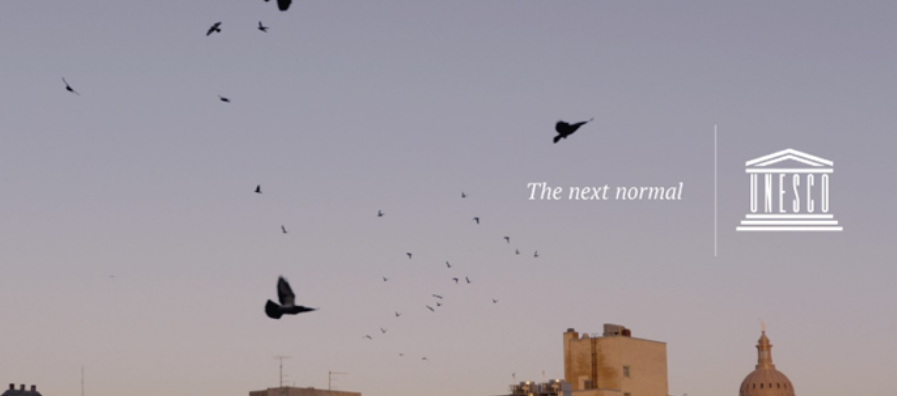![]()
L’UNESCO è stata fondata sulla scia della seconda guerra mondiale e nacque dalla convinzione che quel conflitto senza precedenti potesse dare origine a un mondo migliore e più unito. “Poiché le guerre iniziano nella mente di uomini e donne, è nella mente di uomini e donne che deve essere costruito un mondo migliore”, dissero i fondatori dell’Organizzazione. La loro idea è più pertinente che mai in questo momento, quando i Paesi iniziano a emergere dalla crisi globale COVID-19, che ha messo in discussione le nostre priorità, i nostri modi di vita e il funzionamento delle nostre società.
Le persone in tutto il mondo hanno mostrato solidarietà durante l’emergenza sanitaria e hanno visto come una cooperazione rafforzata può aiutare a costruire un futuro migliore. Ma quando il mondo inizia a emergere dalla pandemia, tendiamo a dimenticare le lezioni che abbiamo imparato e “tornare alla normalità”, ignorando il costo di ciò che consideriamo normale per il nostro ambiente, economie, sanità pubblica e società.
L’UNESCO sta lanciando una campagna globale che sfida la nostra percezione della normalità. Il film da 2 “20” non si basa su argomenti complicati per dimostrare il suo punto. Presenta semplicemente informazioni fattuali sul mondo prima e durante la pandemia. Nel complesso, questi fatti invitano gli spettatori a mettere in discussione le loro idee su ciò che è normale, suggerendo che abbiamo accettato l’inaccettabile per troppo tempo. La nostra realtà precedente non può più essere accettata come normale. Ora è il momento di cambiare.
In quanto agenzia intellettuale delle Nazioni Unite, l’Organizzazione delle Nazioni Unite per l’educazione, la scienza e la cultura (UNESCO) ritiene che la necessità di un cambiamento duraturo debba mettere radici nei cuori e nelle menti delle persone ovunque prima che possa diventare realtà.
La campagna fa parte di uno sforzo più ampio dell’UNESCO per riflettere sul mondo a venire, in particolare attraverso l’iniziativa del forum dell’UNESCO, un laboratorio di idee che riunisce importanti pensatori, il movimento Resiliart, una serie di dibattiti del panel sul futuro della cultura e del industrie culturali, la rete di alfabetizzazione sui futures, nonché il programma sui futuri dell’educazione e le raccomandazioni globali per la scienza aperta e l’etica dell’intelligenza artificiale. Questi sono i principali problemi su cui l’UNESCO ha iniziato a lavorare molto prima che fossero portati al centro della scena dalla pandemia.
L’UNESCO invita i media e gli opinion leader a condividere la campagna “The Next Normal”, creata dall’agenzia DDB di Parigi, disponibile dal 25 giugno 2020.
Più info su come partecipare >>
![]() UNESCO was founded in the wake of the World War II, born of the conviction that the unprecedented conflict could give rise to a better, more united world. Since wars begin in the minds of men and women, it is in the minds of men and women that a better world must be constructed, argued the Organization’s founders. Their idea is more pertinent than ever as countries begin to emerge from the global COVID-19 crisis, which has called into question our priorities, our ways of life and the functioning of our societies.
UNESCO was founded in the wake of the World War II, born of the conviction that the unprecedented conflict could give rise to a better, more united world. Since wars begin in the minds of men and women, it is in the minds of men and women that a better world must be constructed, argued the Organization’s founders. Their idea is more pertinent than ever as countries begin to emerge from the global COVID-19 crisis, which has called into question our priorities, our ways of life and the functioning of our societies.
People across the globe showed solidarity during the health emergency and saw how enhanced cooperation can help build a better future. But as the world begins to emerge from the pandemic, we tend to forget the lessons we learnt and “get back to normal,” disregarding the cost of what we regard as normal to our environment, economies, public health and societies.
UNESCO is launching a global campaign challenging our perception of normality. The 2’20” film does not rely on complicated arguments to prove its point. It simply presents factual information about the world before and during the pandemic. Put together, these facts invite viewers to question their ideas about what is normal, suggesting that we have accepted the unacceptable for far too long. Our previous reality can no longer be accepted as normal. Now is the time for change.
As the intellectual agency of the United Nations, the United Nations Educational, Scientific and Cultural Organization (UNESCO) believes that the need for lasting change must take root in the hearts and minds of people everywhere before it can become reality.
The campaign is part of a wider effort by UNESCO to reflect on the world to come, notably through the UNESCO forum initiative, a laboratory of ideas bringing together prominent thinkers, the Resiliart movement, a series of panel debates on the future of culture and the cultural industries, the Futures Literacy Network, as well as the Futures of education programme and the global recommendations for open science and the ethics of artificial Intelligence. These are major issues that UNESCO started working on long before they were brought centre-stage by pandemic.
UNESCO invites the media and opinion leaders to share “The Next Normal” campaign, which was created by the DDB Paris agency, available as of 25 June 2020.
Support UNESCO’s work here
This campaign a received a support from Open Society Foundations.
Fonte: UNESCO.org

